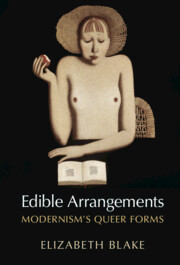Chapter 4 - Feeding and Figuration
Reimagining the Mother and Child
Published online by Cambridge University Press: 26 September 2023
Summary
Chapter 4 moves from eating to feeding, returning to Nightwood and juxtaposing it with Olive Moore’s novel Spleen in order to reveal the ethics of care and control that are developed in each book. Feeding, in both novels, is a way of nurturing that is also a mode of control. In Spleen, a woman rejects the normative pleasures of marriage and motherhood, refusing to feed her child. While this might seem like a valorization of queer negativity in the form of the literal rejection of the child, the chapter reads the novel instead as one that values queer potentiality by refusing the coercive pleasures of nurture. Turning back to Nightwood, it discusses a metaphorical hunger, arguing that Barnes draws on the figure of the mother feeding her child to demonstrate how care may be coercive even in a relationship between adults.
Keywords
- Type
- Chapter
- Information
- Edible ArrangementsModernism's Queer Forms, pp. 139 - 173Publisher: Cambridge University PressPrint publication year: 2023

